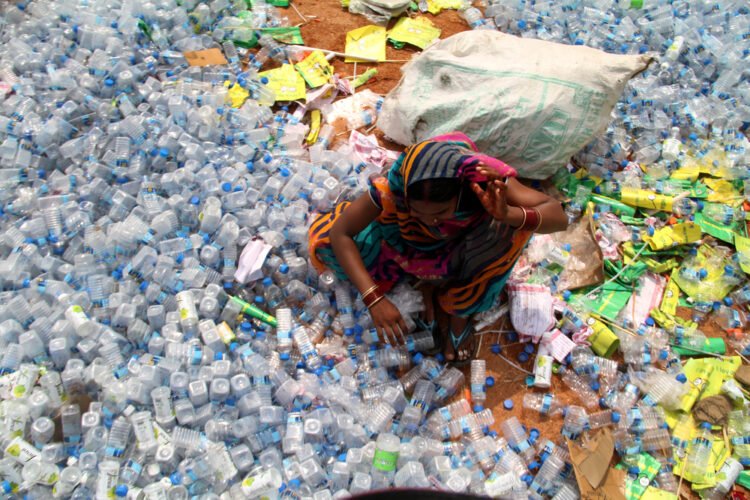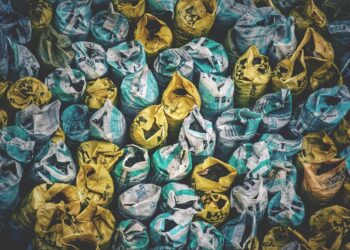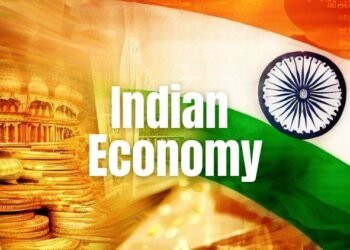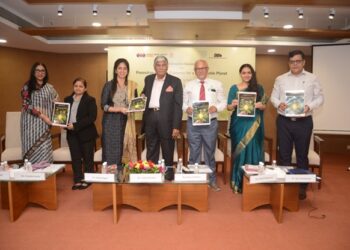Recently, Delhi’s civic body tied up with a private firm to collect and dispose of E-Wastes while Bihar Government authorised 142 E -Waste collection points in various districts. So, what is this E Waste, and why is it important to collect and dispose it of?
What is E-Waste?
Electronic waste can be broadly described as discarded, surplus, obsolete, broken, electrical or electronic devices. It includes all such waste from electronic and electrical appliances that have reached their end-of-life period or are unfit for their original intended use and are meant for recovery, recycling or disposal. It could be a computer and its accessories like monitors, printers, keyboards, central processing units; typewriters, mobile phones and chargers, remotes, compact discs, headphones, batteries, LCD/Plasma TVs, air conditioners, refrigerators and other household appliances.
Categorised as hazardous and non-hazardous E-Waste includes ferrous and non-ferrous metals like copper, aluminium, silver, gold, platinum, palladium, etc., plastics, glass, wood and plywood, printed circuit boards, concrete, ceramics and rubber. It is the presence of elements like lead, mercury, arsenic, cadmium, selenium, hexavalent chromium, and flame retardants that makes E-Waste risky. Containing over 1000 different substances, with several being highly toxic, E-Waste disposal creates serious pollution.
Quantum of E-Waste Generation
The 2019 United Nations report states that the consumers discarded 44 million tonnes (MT) worth of electronics each year with only 20 per cent recycled sustainably. India generates about 3 million tonnes annually and stands third among the E-Waste producing countries, after China and the US. An Assocham-EY report suggests that given this growth rate, the country will have 5 MT by 2021.
The rapid technology advancements and newer electronic products makes consumers switch their existing models. This decreases the life cycle of these goods while exponentially increasing E-waste generation.
Another factor this time is the ongoing Covid-19 pandemic which has kept people indoors resulting in higher usage of electronics goods.
While the mounting quantity of discarded E-Waste is overwhelming, its improper disposal is particularly worrisome. It usually reaches either the landfills or the unregulated markets. Summing this process in an article published in india.mongabay.com Ashley Delaney, Founder of Group TenPlus, a Goa company managing collection of electronic waste said, “An ordinary circuit board from a mobile or laptop contains roughly 16 different metals. Most informal sectors will probably be able to retrieve a couple of metals and landfill the rest. Hazardous chemicals like mercury, which are used to extract these metals, leach into the soil, which will be damaged forever. If you find discarded batteries, tube lights, CFL bulbs, chances are the soil around them will be barren.”
Increased quantities will result in the leaching of metal to reach everywhere, including food. E-Waste reaching oceans in large quantities contaminates water with gaseous or liquid toxins, which are not visible.
Recycling Helps
The extracted metals and plastics from E-Waste can be used to make more electronic goods. Sounds good, but the process is not easy.
Metals are tough to extract as pointed out by a United Nations report It states that the total recovery rate for cobalt is 30 per cent though technology exist that could recycle 95 per cent. Notably the energy efficiency of recycled metals are two to 10 times more than metals smelted from virgin ore. So it makes sense to have effective reuse methods by ensuring a sustainable chain in manufacturing and recycling.
Further, extraction provides access to rare earth metals – which are definitely to obtain – and so worth recycling. According to estimates, the worth of global E-Waste is around $62.5 billion annually.
Formal Sector’s Dilemma
India has few formal recyclers and their role is limited to segregation, dismantling of E-waste till the size reduction stage of printed circuit boards (PCBs). The pre-processed PCBs are sent abroad to smelting refineries for further recovery of precious metals like copper, silver, gold, aluminum, palladium, tantalum, ruthenium, platinum etc. and treating the slag byproduct in an eco-friendly manner.
The limited organised recyclers face stiff competition from the informal sector and they receive a very small proportion of the obsolete goods. A Rajya Sabha document on E-Waste cites the example of a Noida-based 500 tonnes capacity unit processing only 200 tonnes so far. Likewise a Roorkee unit with 36,000 tonnes annually processes just 600.
Hazards of the Informal Segment
The informal sector dominates the collection, transportation, processing, and recycling of E-Waste. Well networked and unregulated, it is unable to recover materials that can be besides creating serious hazards in terms of release of toxins in the environment and affecting the workers’ health and safety.
For instance Delhi’s Seelampur is India’s largest E-waste dismantling centre with adults and children spending 10 hours daily to extract reusable components and precious metals. They use processes like open incineration and acid-leaching both to the detriment to self and ecology. Such workers suffer from stress, headaches, shortness of breath, chest pain, weakness, and dizziness and even DNA damage.
Same situation prevails elsewhere as shown in a 2018 documentary “Welcome to Sodom” exploring the Agbogbloshie dump in Ghana, where life revolves around toxic waste as every year about 2,50,000 tons of sorted out computers, smartphones, air condition tanks and other devices from outside are dumped here. In India too large amounts of waste electrical and electronic equipment (WEEE) enters from foreign countries.”
Interestingly the informal channel includes repair shops, used product dealers, e-commerce portal vendors, who use discarded electronics for reuse and cannibalization of components.
India is ahead of most other countries in the region being the only country in Southern Asia with E-Waste legislation. The law mandates only authorised dismantlers and recyclers to collect e-waste. In 2016, the E-waste (Management) Rules, mandated collection targets and transferred responsibilities to the producers – Extended Producer Responsibility (EPR).
For E-Waste collection and disposal the integration of the informal sector into a transparent recycling system is crucial.
Talking to india.mongabay.com, Pranshu Singhal, Founder, Karo Sambhav said: “We work with waste collectors and aggregators and help them get formalised – ensure everyone has pan cards, bank accounts and give invoices, and ensure that waste is traceable.”
In E-Waste management, manufacturers, too, play a key role. They need to integrate in their production process use of recycled material besides acting as collector of their old products for recycling.
Role of Consumers
Consumers should use their gadgets for longer and change it only when necessary and not for style. In case a fault in the gadget is repairable, then they should opt for that rather than discarding. While buying any product, they need to keep in mind that it should be recyclable.
As pointed out in a World Economic Forum report, products should be designed so that they can be reused, durable, and safe for recycling. Further, producers should also have buy-back or return offers for old equipment.
Emphasising on the value of E-Waste, an article on teriin.org states: “E-waste is a rich source of metals such as gold, silver, and copper, which can be recovered and brought back into the production cycle. There is significant economic potential in the efficient recovery of valuable materials in e-waste and can provide income-generating opportunities for both individuals and enterprises.”
S Ravi (IANS)
Disclaimer: Information, facts or opinions expressed in this news article are presented as sourced from agency and do not reflect views of India CSR and hence it is not responsible or liable for the same. As a source and news provider, the agency is responsible for accuracy, completeness, suitability and validity of any information in this article.






















